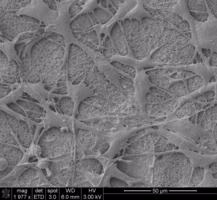A paper recently published in European Polymer Journal describes the effect of carbon nanotubes on a biopolymer blend. Dr Rob Russell, recently graduated from University of New South Wales, Sydney, has published work from his PhD thesis that shows the nanoparticles impart electrical conductivity to the polymer film while still providing a surface that supports cell growth. This is important because it allows for electrical stimulation to be applied through the film, which has been shown to promote and even guide the re-growth of nerve cells on similar materials.
 |  |
| Infrared absorbance map overlaid on image of a polymer blend containing carbon nanotubes, showing areas of highly deuterated polymer (red). | Mammalian cells growing on the surface of a bionanocomposite film. |
The paper also explores the effect of carbon nanotubes on polymer miscibility, using deuterium-labelled polymer produced by bacterial synthesis in the National Deuteration Facility. Deuteration allowed for chemical mapping of the film blend using Infrared microspectroscopy, and showed that the nanoparticles produced a film with improved material properties.
The full publication can be found here https://doi.org/10.1016/j.eurpolymj.2018.05.031
Published: 02/07/2018


